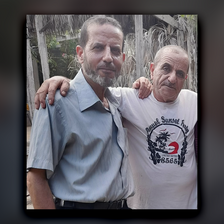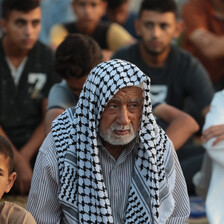The Electronic Intifada 17 June 2024

Gathering for Eid prayers at the Great Mosque of Gaza City.
The Electronic IntifadaLeaving Gaza for Egypt has meant being away from family members with whom I had spent all my life.
It has meant going through the toughest moments.
Eid al-Adha used to be a wonderful occasion.
There was a sense of joy as I met and prayed with friends, relatives and neighbors in the open air. It would be even more beautiful if the sun would break through the clouds.
I remember my neighbors gathering outside our building, which was decorated with colorful balloons. They would shake hands and soak up the happy vibes.
Each morning of Eid my father would tell me to be ready soon. We would be going to see my aunt in an hour’s time.
It is all very different now.
I am in a room in Egypt. Nobody knocks on the door to check on me.
It gets even worse when you see families enjoying Eid and you have been unable to have a video call with your own family. You have not been able to wish them a happy Eid.
How are people spending their time in Gaza?
My friend has contacted me to say he has been diagnosed with hepatitis A. He is trying to get medicine but it is very scarce.
He is not alone. Large numbers of other people have contracted hepatitis A because the water is polluted.
They include some of my relatives.
“Life worth living”
Eid is a time of hospitality. Yet instead of welcoming visitors with sweets, Gaza’s families have been waiting for more than eight months just to have a calm night.
I have been trying to call my aunts for a number of weeks. And I cannot get through to them.
I did, however, manage to contact a cousin via text messaging. I felt too shy to say “happy Eid.”
How can anyone be happy when they lack good food or even safety?
Those who have been displaced to Egypt are out of immediate danger. Yet that doesn’t stop the melancholy from descending on us.
A friend, who has also moved to Egypt, spoke about how praying at Eid has become emotionally difficult.
People are unable to gather for Eid prayers in most areas of Gaza. The genocide is preventing them from standing together in unity and love.
Some have nonetheless managed to hold prayer gatherings. In Gaza City, people have made clear that they would rather keep the door of faith ajar than shut it completely.
By doing so, they have sent a message to all humanity. They have confirmed that Gaza’s people are still praying, smiling, loving each other, calling for peace and trying to relieve their exhausted hearts.
My friend Ibrahim has commented on how he felt about seeing Gazans praying amid the rubble of the Great Mosque – also known as the al-Omari mosque – in Gaza City.
“Gaza brings you back to life, though you are far away from your homeland,” Ibrahim stated.
It reminds me of a few lines from the poet Mahmoud Darwish. You can read these lines on the walls of streets leading to Gaza’s shore:
We have on this land all of that which makes life worth living
On this land
The lady of our land
The mother of all beginnings
And the mother of all ends
She was called Palestine
Her name later became Palestine
My lady….
Because you are my lady
I have all of that which makes life worth living.
The writer is from Gaza.





